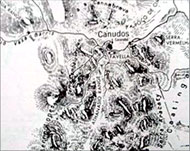Bible of Brazilian nationalitiy
The story of the Canudos Rebellion pervades Brazilian national consciousness and continues to leave an impression 100 years after the rebels were crushed.

It is a true tale of the total annihilation of one of the world’s first experiments in socialism, but remains a secret chapter of history for most.
In the late 19th century, thousands flocked to the northeast of the country in search of a better life – settling in a Brazilian village that came to be known as Canudos.
The villagers contributed half their possessions to the community as a whole, maintained family farms and plantations and supported poor new arrivals.
But their staunch independence and lifestyle were too much for the authorities, who launched three successive military invasions until all were killed or dispersed.
“The causes and consequences of the Canudos Rebellion remain of vital relevance today, not only for Brazil, but for all countries where there is a division between the ruling elite and the mass of the poor,” says academic Zelia Roelofse-Campbell, head of the Unisa centre for Latin American studies.
Massacre
 |
|
30,000 people died at Canudos |
“In Canudos, 30,000 people who never surrendered perished at the hands of a government which considered itself superior. Through its control of the means of communication of the time, the ruling elite were able to silence the voices of their victims and portray them as dangerous fanatics and traitors,” she says.
Euclides da Cunha, a civil engineer turned journalist, chronicled the events and gave birth to what is regarded as a Latin American classic, Brazil’s greatest book and the ‘Bible’ of its nationality.
Yet Os Sertoes, or Rebellion in the Backlands is virtually unheard of outside the country.
One hundred years after its publication, anniversary celebrations are continuing with grand theatrical dramatisations and academic reappraisals.
Its significance is echoed in the present day struggle in Brazil of the landless peasants’ movement, the MST, whose members are regularly jailed, threatened and killed.
Da Cunha’s epic account tells of the huge battle at Canudos in the northeast against the poor followers of a religious mystic, Antonio Conselheiro, preaching a socialistic form of Christianity.
Subversion
|
“It brought into focus a part of the national territory and consciousness that had not been seen in that light and intensity before. It stands alone in the literature” Renata Wasserman, |
Conselheiro hid away in Canudos with his followers after publicly burning official Acts for the gathering of taxes by the new Republic.
“The troops as they continued their rapid advance were animated by the irrepressible lust of battle. They were in that highly dangerous state of mental intoxication in which the soldier feels doubly strong, through the certainty of his own strength and the knowledge that he will be permitted an absolute licence in the indulgence of his most brutal instincts,” wrote da Cunha.
Euclides da Cunha
Euclides da Cunha, a former army officer became famous overnight with his sensational masterpiece, which mixed war reportage with anthropology, sociology and the identity of a nation.
“It brought into focus a part of the national territory and consciousness that had not been seen in that light and intensity before. It stands alone in the literature,” says Renata Wasserman professor of English and American Literature at Brandeis University, Massachusetts, USA.
Many people also regard the book as a struggle in itself, a long, dense, slightly archaic tome. Many people simply know it as the boring book they were forced to read at school. Its intricate geological detail would cause all but the most ardent student’s eyes to glaze over.
|
“The ghost of Caundos is yet still in Brazil. We are living in an economic dictatorship” Ze Celso, |
Ze Celso, 66, sporting a long white beard, plays the part of Conselheiro in the second part of the theatre group Oficina’s adaptation of the book.
One of Brazil’s most famous theatre directors, Celso has put together three shows in homage, which began last year with The Land, continues with Man’and concludes next year with The Struggle. Oficina’s brand of theatre is big budget, five-hour shock-spectacular.
“The ghost of Caundos is yet still in Brazil. We are living in an economic dictatorship,” says Celso.
Father-of-six, Antonio Herci has paid his own homage to history – he runs a bar in Sao Paulo, which he named Canudos.
Roots
“The political and social background of Canudos was much stronger than the religious aspect. It was, in fact, my kids who chose the name. Canudos was a collective. We operate the same way, all the money that comes into the bar is divided between us,” says Antonio.
His son Marcio Glaucio Ribeiro says he learnt much more about Canudos after he left school. “It was an obligation to read ‘Os Sertoes’ at school, so of course nobody read it because it was old and boring. I still haven’t read it, but I’ve seen the film!” he says.
The most famous phrase of the book is the politically and religious metaphorical prophecy that “the backlands will become the sea and the sea will become the backlands.”
Area now flooded
In a literal sense, this turned out to be true in the case of Canudos. In an apparent attempt to bury the memory of the massacre, the government in the 1960s flooded the area with a dam.
“Canudos did not surrender. The only case of its kind in history, it held out to the last man. There were only four of them left: an old man, two other fully-grown men, and a child, facing a furiously raging army of five thousand soldiers. We shall spare ourselves the task of describing the last moments. We could not describe them,” wrote da Cunha.